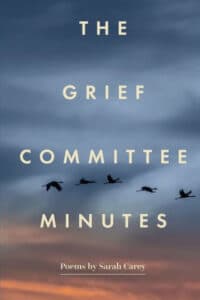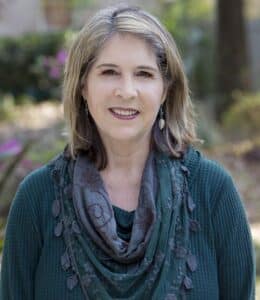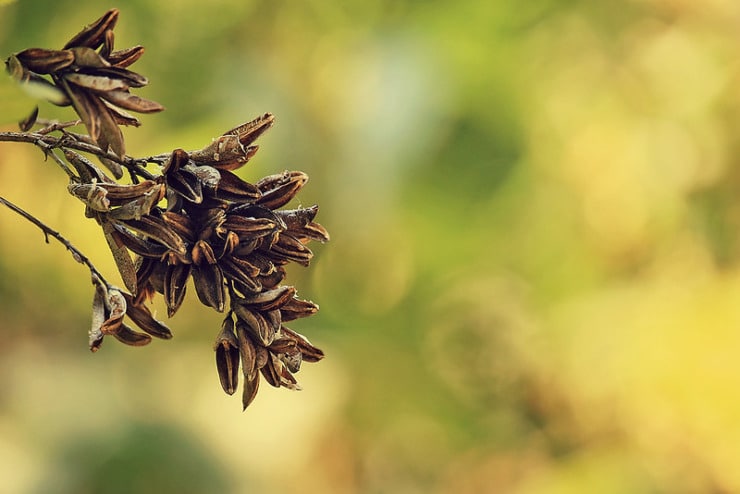Sarah Carey explores the variety and depth of our many griefs
A year passed before I came face to face with my grief over the death of my father. There wasn’t time for me to grieve; I was the executor of his estate, and his estate was a mess. A huge mess. He’d kept my mother unaware of just what a mess it was, and she was as bewildered as the rest of the family. When we finally emerged from the financial fog, grief hit me like a freight train.
“There is no grief like the grief that does not speak,” Henry Wadsworth Longfellow once wrote. The man knew what he was talking about.
Poet and writer Sarah Carey knows about grief. Her new poetry collection, The Grief Committee Minutes, isn’t solely about grief, but much of it is. What I particularly like is how Carey identifies and explores the kinds of grief.
Grief is associated with loss, but not all losses are the same. Neither are all kinds of griefs.
Crey begins with nature, writing about animals like deer, peregrine falcons diving for prey, childbirth, and invasive trees. And storms like hurricanes. She moves to memories of home, changed forever by development. And then she reaches the destruction of memory by dementia and Alzheimer’s, a living loss that creates a living grief.
Relative Risk

should know our half-blind mother can’t live alone, how they are
clear she can’t afford to fall—the only way to keep her going
on her own (not risk-free) is a scooter or a four-wheel walker, or to
mover her to a place, they won’t say where—best to keep
the care type vague—helpful doctors will tell you
recommended choices: memory pills, life locked inside, a safe
space, always a mask, no rugs or dancing, hugs, even
if your loved one, if Mom, is vaccinated, if
we instead allow her finger-walking walls, her wandering, it
wouldn’t be the worst to drop and die at home, we’ll say—what kills
is a voice silenced or a vision atrophied, when all your
good intention stymies dignity, what we recall of spirit.
Carey has more: the grief of war, like in the Ukraine; the grief of the assassin’s bullet; the injury from a fall; the lonely death of a stepfather. She writes with the piercing eye of the poet; she also writes with compassion. This poet knows loss; she knows the grief of loss.

Sarah Carey
One of my favorite poems in the collection is “All My Father’s Heroes,” in which Carey describes her estranged father’s study, the pictures of his heroes “stacked in storage, long removed / from walls where, hung strategically / above my father’s desk, they called / his name in study after study, / in each house he lived without us…”
Carey has been a journalist and university communicator as well as a writer and poet. She previously published two poetry chapbooks, The Heart Contracts (2016) and Accommodations (2019), and her poems have been published in such literary journals as Gulf Coast Review, Valparaiso Review, Sugar House Review, Florida Review, Atlanta Review, and many others. Her work has been recognized with a number of prizes and awards, including three separate recognitions for The Grief Committee Minutes. She is currently the director of Communications for the University of Florida College of Veterinary Medicine, and she lives in Gainesville with her family.
As much as it’s about loss and grief, The Grief Committee Minutes is also about what existed that occasioned the loss, what once was that now causes the grief. As much as it is about loss, grief is also a measure of love and depth of feeling. Even as we grieve the loss, we cherish what we had. Carey’s poems are saturated with what she’s cherished.
Photo by akigabo, Creative Commons, via Flickr. Post by Glynn Young.
How to Read a Poem uses images like the mouse, the hive, the switch (from the Billy Collins poem)—to guide readers into new ways of understanding poems. Anthology included.
“I require all our incoming poetry students—in the MFA I direct—to buy and read this book.”
—Jeanetta Calhoun Mish
- Longfellow’s “Paul Revere’s Ride”: Creating a National Legend - April 17, 2025
- Poets and Poems: Katie Kalisz and “Flu Season” - April 15, 2025
- Poets and Poems: Michelle Ortega and “When You Ask Me, Why Paris?” - April 10, 2025


Leave a Reply